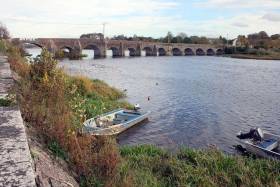Displaying items by tag: O'Briensbridge
River Shannon Walkway Closed Over Culvert Faults At O’Briensbridge
Waterways Ireland has closed the public footpath running south from O’Briensbridge playground alongside the River Shannon south of Parteen Weir for the foreseeable future, following the discovery of critical failures in two culverts under the path.
Preliminary investigations revealed the need for urgent replacement work on both culverts, the cross-border body for Ireland’s inland waterways says.
It adds that due to the sensitive habitat at the site on the Clare/Limerick border, planning permission is required before the works can go ahead, and this could take up to six months to come through.
“The health and safety risks associated with the two structures are such that it is essential the route is closed and remain so, until after the refurbishment works are completed,” it says.
“Waterways Ireland is aware that this is a popular route for the local community and apologises for any inconvenience caused by this closure.”
Irish Schools Regatta Draws Record Entry
#ROWING: Next weekend will see one of the biggest rowing invasion of the Mid-West since the Vikings sent their longboats up the Shannon estuary in the 9th century. With over 800 crews entered over two days it is the largest rowing undertaking ever to take place at the Limerick Regatta course in O’Briensbridge. On Saturday, Limerick Regatta has a full programme, with events running every four minutes over 11 hours, while on Sunday the biggest ever Irish Schools Regatta will be held.
The Schools Regatta was first run in O’Briensbridge in 2006 as part of the University Championships. Eleven crews from five schools battled for honours in two double sculls events. The following year additional events were added and the event started to grow. Given that the University Championships always took precedence at the combined event, there was a limit on the size of the Schools Regatta. This ceased to be the case when Limerick Regatta agreed to run the event in 2014 on a stand-alone basis: there was an entry of just over 300 crews from 45 schools. This year there are almost 400 entries from 71 schools.

























































